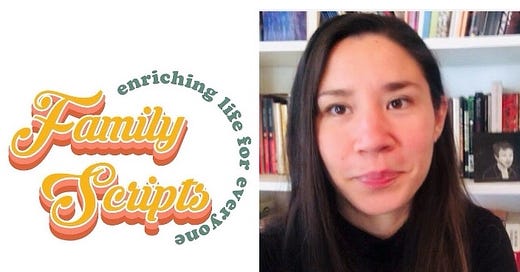As an educator in NYC I’ve had the pleasure of working in a variety of schooling setups, from one-on-one tutoring, homeschooling co-ops, to traditional schools. I’ve also been fortunate to talk to a lot of different people about how they approach learning and education. “How interesting it would be,” I thought to myself, “if someone put these together into an interview series and we could gather and share thoughts and maybe even reimagine the ways we educate our kids!” And well, that pretty much brings us to right now.
In addition to providing reading guides, learning activities, and creative writing lessons and prompts, I am delighted to also share some great insights in this interview series as well. I hope you enjoy.
This time I got the chance to talk to Hope Henchey the creator of Family Scripts. Hope is a fellow Substack writer, a fellow mother, and fellow lover of all things learning. I am deeply grateful for her wisdom and gentle touch and hope you get as much out of this exchange as I have.
Interview with Hope from Family Scripts
1. My first question is a general one, but something that I think is helpful to set down some foundation. How did you decide to educate your children? Was this a conversation you had, was this born out of circumstance?
I was homeschooled until 4th grade, then I went to private school. I was good at school and had some incredible teachers, but overall my education felt like a waste of time, and I wasn’t very prepared for adult life. On the other hand, my husband was homeschooled through twelfth grade and he did have time to develop life skills, pursue his interests, and complete some college. We never really had a discussion about how we would educate our kids because we both knew homeschooling was a good fit for us.
2. If you had to put it into words, what would be your "education philosophy"? Sorry if that question is kind of annoying. More than just a statement I am curious what your general approach is to education.
My favorite education philosophy is the Charlotte Mason method, which emphasizes learning through story, nature, art, and play. I had five babies in eight years, so in the more hectic seasons, I used more of an "unschooling" approach. Those times with less formal schooling always took me by surprise, though, because at the end of the year when I prepared for their evaluations, I was amazed by how much they learned through field trips and life experiences.
3. I want to ask if being a part of your children's learning has changed you as a parent, but probably the better question is HOW has it changed you as a parent?
What an amazing question! Parenting is so humbling. I think the most important thing I've learned is to show my kids that I'm learning with them. (You could say I’m in 24th grade.) Everything that I teach them about history, science, and literature is something I could learn more about, too. We're co-learners. And even when I teach them about subjects that bore me like math and spelling, I’m learning patience. This applies to all of life, too; when I get overly upset with them or even just waste a lot of time on my phone, those are chances for me to show them how to apologize and make things right. They'll make mistakes when they're grownups, too, and I want them to know how to deal with their own failures well.
4. When you think of "traditional schooling" what do you think they get wrong?
The traditional approach to education works great for some kids, but others--like one of my sons---can really struggle with that method and be led to believe that they're bad at school. Different kids need different approaches to thrive. But I don't know how one teacher could give 25 kids their own customized education, especially with limited support from administration and parents. I respect teachers so much. You guys have been given a task that's harder than the rest of us can understand.
5. If you could give some advice to families who want to take a more active role in their child's education, are there any words of wisdom to impart? Is there a good place to begin?
Find things that interest you about what your kids are learning. Why does this topic matter? What about this topic piques your child’s curiosity? What piques your curiosity? What about your child’s current studies will matter in adulthood? What can you do to stoke the fire of a love for learning? I love this paraphrase of something Plutarch said: “Education is not the filling of a pail, but the lighting of a fire.”
6. And lastly, is there anything about you or Family Scripts that readers should know about?
I make Family Scripts for all kinds of families, regardless of educational philosophy, because no matter how you're teaching your kids, it's important that they know you like being with them. My mom was really good at that (and still is) and she built confidence in my brother and me that I wish every kid could get from their parents and caregivers. Your kids won’t remember most of the things they’re learning, but they’ll remember if you liked them.
Hope writes for Family Scripts, which is a daily newsletter aimed to encourage you in life and parenting. This month's theme for personal growth is creativity. A paid subscription costs $5/month, but Hope is offering readers of For the Love of Words a 20% discount with this link.
Thank you so much for reading this. If you or someone you know might enjoy this, feel free to share. It helps a lot and it would make my year if you did!
I’d love to hear your thoughts about this interview. What questions do you still have? What part of this conversation spoke to you?





